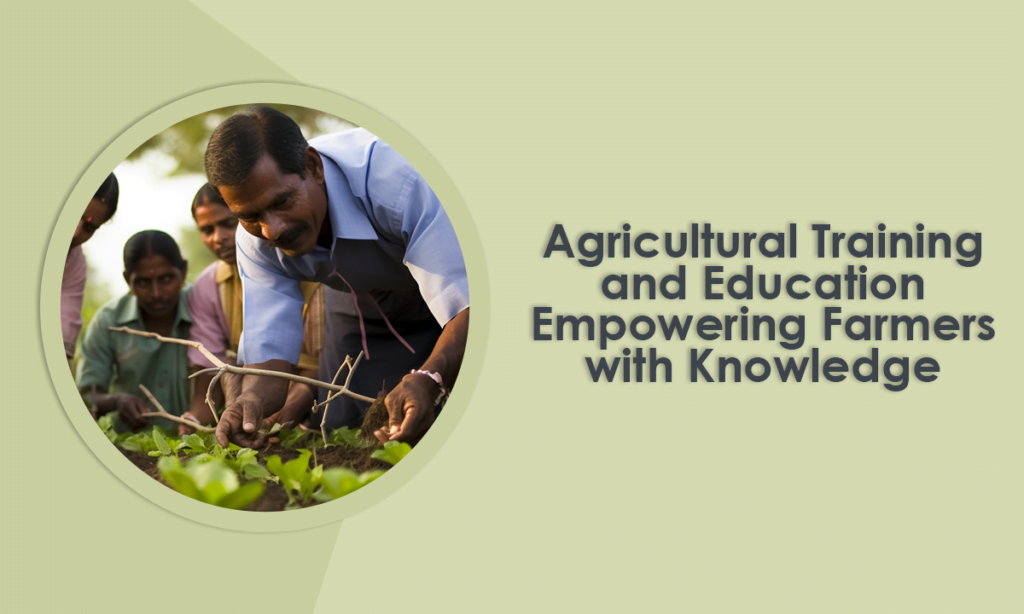Introduction
Agriculture has been the backbone of India’s economy for centuries, providing sustenance and livelihood to millions. With the majority of the population depending on agriculture, it is essential to equip farmers with the knowledge and skills necessary to face modern challenges and embrace sustainable practices. Agricultural training and education play a pivotal role in empowering farmers with the latest advancements, best practices, and innovative techniques, ensuring a prosperous and resilient agricultural sector.
In this blog post, we explore the significance of agricultural training and education from the Indian perspective.
The Need for Agricultural Training and Education
Indian agriculture faces various challenges, including unpredictable weather patterns, soil degradation, water scarcity, and market fluctuations. Additionally, the increasing population puts pressure on farmers to produce more food with limited resources. To address these challenges, agricultural training and education are vital for the following reasons:
Enhancing Productivity: Training equips farmers with modern techniques and knowledge to improve crop yields and overall agricultural productivity.
Sustainable Practices: Education promotes sustainable farming methods that conserve natural resources, protect the environment, and reduce the reliance on chemical inputs.
Adapting to Climate Change: Farmers need to be aware of climate-smart practices and resilient crop varieties to adapt to the changing climate and mitigate its impact on agriculture.
Access to Technology: Training exposes farmers to advanced agricultural technologies, including precision farming, IoT-based solutions, and mechanization, enhancing efficiency and reducing labor-intensive practices.
Value Addition: Education enables farmers to explore value addition opportunities, such as food processing and agro-based industries, increasing their income and reducing post-harvest losses.
Initiatives for Agricultural Training and Education
The Indian government, along with various NGOs and private organizations, has launched several initiatives to promote agricultural training and education:
Krishi Vigyan Kendras (KVKs): KVKs serve as knowledge and resource centers, providing training, workshops, and demonstrations on improved farming practices to farmers at the grassroots level.
Farmer Field Schools (FFS): FFSs bring farmers together for hands-on learning, where they actively participate in field activities and experiment with new techniques under expert guidance.
Rural Agricultural Extension Services: The government’s agricultural extension services facilitate the transfer of knowledge from research institutions to farmers, ensuring the adoption of best practices.
Agricultural Universities and Institutes: India has several agricultural universities and institutes that offer specialized courses and research opportunities to enhance agricultural knowledge.
Digital Initiatives: With the increasing use of smartphones, digital platforms, and mobile apps, agricultural information, weather forecasts, and advisory services have become easily accessible to farmers.
Benefits of Agricultural Training and Education
Empowering farmers with knowledge through training and education yields numerous benefits:
Increased Yield and Income: Implementing improved practices and techniques enhances crop yield and income for farmers, contributing to rural prosperity.
Sustainable Agriculture: Awareness of sustainable practices helps preserve the environment, conserve resources, and promote ecological balance.
Risk Mitigation: Knowledge about climate-resilient practices enables farmers to cope with adverse weather conditions and minimize crop losses.
Empowerment and Confidence: Training instills confidence in farmers, making them more receptive to change and open to experimentation.
Strengthening Rural Economy: A well-trained and educated farming community can drive economic growth in rural areas and reduce urban migration.
Conclusion
Agricultural training and education play a transformative role in empowering farmers with the knowledge and skills needed to overcome challenges and embrace opportunities. By equipping them with the latest advancements and sustainable practices, we can ensure food security, environmental conservation, and rural prosperity.
The Indian government, in collaboration with various stakeholders, must continue to invest in agricultural training and education, making it accessible to every farmer, regardless of their location or socio-economic background. As we embrace a knowledge-driven agricultural sector, we pave the way for a sustainable and thriving future for Indian agriculture.

Pingback: Agroforestry: Blending Agriculture and Tree Plantation for Sustainable Land Use - Sankalp Bhoomi Trust